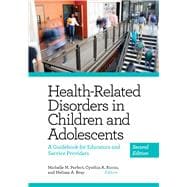A comprehensive revision of a critical resource for school-based professionals tasked with providing care for children’s disability conditions, their social-emotional health, and their educational needs.
The volume of information on health conditions affecting children and adolescents has grown and become more complex over the last several decades, making it a challenge for school-based professionals to support children's learning and growth. Now in its second edition, Health-Related Disorders in Children and Adolescents discusses how school professionals can be effective partners in collaborative care teams for the more than 15 million school-aged children experiencing medical conditions.
With chapters written by experts from a range of disciplines in psychology and featuring the latest genetic research, the work is organized around major body systems. Each chapter systematically covers etiology, symptoms, and outcomes for children with the condition, and recommends science-based interventions school professionals can carry out. This edition emphasizes care coordination among families, and medical, behavioral health, and educational professionals.








